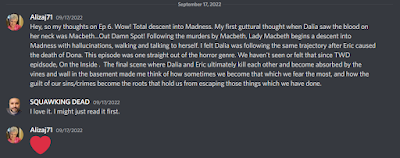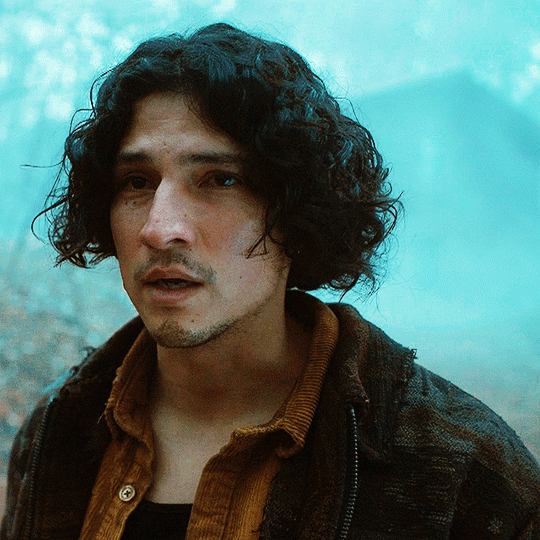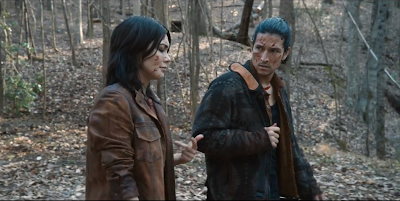|
|
 |
| ↑↑↑Click the above graphic↑↑↑ to listen to this episode in your favorite Podcasts App |
Originally Recorded: 2022/09/17
#TalesOfTheWalkingDead's #SeasonFinale contains elements/running themes from all its prior episodes to deliver one of it's more "mystical" episodes … that may not be as mystical as it seems! We're particularly proud of the brain nuggets we produced during our conversation and the opportunities this episode provided us to talk about how we see this series, on the whole.
The unedited episode recordings are filled with filthy, filthy humor in the pre-show and some heavily edited down content during the actual conversation. Get EARLY ACCESS (WAY in advance) to our full-length, unfiltered discussions by either buying us a coffee or joining a membership tier for as little as $1 /month! Either way, you should consider creating a FREE Ko-fi account and FOLLOWING us at Ko-fi.com/SQUAWKINGDEAD, so your thoughts can be a part of the conversation (we don't post our recording schedule on Social Media)! Get started, here:
| David Cameo: | |
| Rachael Burt: | |
| Bridget Mason-Gray: |
| Jasmine: |
- ☕ Phineas Coffee is top-tier, specialty-grade coffee! Level-🆙 your coffee game: SQUAWKING DEAD fans receive 10% off every time they use the promo code SQUAWKINGDEAD at check-out: https://www.phineascoffee.com?aff=581
- Jasmine liked this episode enough, but would've loved it more had it felt more like an episode of The Walking Dead. Remember to follow her trendy Instagram account:
- Rachael thought this episode started out pretty tense, but fizzled out at the end. Because Doña Alma is regarded as a bruja, she cites Brigitte Kali Canales, who played Rachel in Fear The Walking Dead's 6th Season, who starred in The Old Ways on Netflix. We hosted both Brigitte and Executive Producer of The Old Ways, Christopher Alender, in a watch party/Q&A:
- Bridget argues that this was psychological horror well suited for cable television and, contrary to Rachael's opinion, most horror doesn't end in a completely satisfying manner. In addition, loved the Macbethian elements. Like Bridget, AMC+ subscribers on Amazon Prime had this episode cut short, which might've messed with her first impression of this episode.
- 🎖SURVIVORS Tier Member, Aliza Jones, wanted to come on, but settled on giving us her take in text (via our SQUAWKING DEAD Discord Server), instead:
- ...Dave hones in on the last thing Aliza says: the guilt of our sins/crimes become the roots that hold us from escaping those things which we have done. Occasionally, our team of survivors has to come to grips with what they've done once they are behind the safety of walls and, in this episode, so do Idalia and Eric.
- Bridget highlights how this episode does a great job of holding back the horrors that Eric and Idalia wrought on their fellow survivors, as much as possible, until the very end, which allowed us to primarily focus on the painful nature of their own guilt.
- In the audience, Blogmaster extraordinaire, Aidan, asks who we'd like to see in a possible 2nd season of Tales of The Walking Dead. He mostly implies that he'd love to see characters we've seen from the other series and their possible backstories. Dave immediately says no! Rachael just doesn't like the anthology episodes simply because she can't accept that we'll never see these characters again. They break even with this episode, as we can accept that we won't see Eric and Idalia again.
- Aidan then probes us for our favorite episodes of Tales of TWD. Bridget: the first two
- Bridget also mentions she's fine with this anthology series! Dave takes a moment to explain, by way of bringing up Star Trek: The Next Generation's beginnings, that this series might be another entry point for new fans of The Walking Dead Universe. Rachael counters, in an attempt to bring it back to this episode's discussion, that Black Mirror on Netflix did a better job, as an anthology series, of delivering a beginning, middle, and end satisfying enough for us to be OK with letting go of these characters once the episode is over. Bridget adds that having other TWDU series preceding Tales of TWD messes with our ability to let go of some of the characters on this series.
- Rachael liked Evie/Joe the most because of it's TWDU feel: it had humor and delivered a satisfying resolution. Jasmine chose Dee as her favorite (Rachael's 2nd favorite) because it most resembled and had actual ties to The Walking Dead. Contrary to his peers, who disliked this episode, Dave loved Davon the most because of its cleverness in construction and incredible cinematography and score: even more than Blair/Gina, it gave us something completely fresh and new, which is what he wanted to get out of this series. Sherrandy, in the audience, loved Blair/Gina the most and compares it to The Boys animated series Diabolical on Amazon Prime because of its tangential, yet outlandish way of connecting it to the greater TWDU.
- On the note of what folks may have wanted to see more of, other than their beloved characters from TWDU, Rachael would've wanted to see more actual walkers. On that note, Jasmine felt that the walkers in this series were slightly off. Dave brings it back to Sherrandy's comparison to Diabolical in that the walkers needed to feel different to pair well with the mood of each episode. This opens up a discussion of the way walkers looks have changed, even the recently reanimated, over time (across TWDU).
- Bringing it back to this episode, Dave explains how, on first watch, he felt the same way as Rachael in that the ending was a little unsatisfying, even though he liked it overall: but just like Davon, he thought about it more as time went on and it increased his appreciation. One of those things is something we've been looking out for, which is thematic connections to other episodes, one of which is that it's possible that, just like Blair/Gina, Eric could be suffering from Folie à deux as a result of Idalia's delusions.
- Bridget agrees that it could be a form of shared psychosis, but submits that the episode could also be told solely from Idalia's perspective (and that we're not seeing things as they truly happened). An example of this is when Eric says, "You're doing this," near the end, it could actually be that Idalia is the one throwing objects around the room (rather than the ghost of Doña Alma).
- Dave pushes Bridget to explain, if it is being told from Idalia's perspective, how does that explain Eric's own hallucination of Maria at the front gate? It could be that the hallucination is still not Eric's, but what Idalia imagines happened there (and Eric might have been trying to leave, for all we know) and stops him in the creepiest way possible. Mental illness, itself, is another thread that flows throughout each and every episode of Tales of TWD.
- Moving away from the imagined/figurative, Sherrandy offers up a literal reason why they are both experiencing hallucinations: the grain from the bread they ate might've been infected with a fungus called Ergot, similar to the women who were persecuted at the Salem witch trials. However, Dave takes a moment to remind the audience that Idalia was hearing whispers as they were entering the compound. Dave, initially, wanted to discuss how all of this could've been caused by the red fluid oozing from the basement walls, but none of the possible liquids lined up with the symptoms they were experiencing, completely. However, Bridget does remind us that Eric was suffering from a headache near the end and spit out the water Idalia gave him, so at least his delusions might be explainable, especially if Idalia is diagnosed with Munchausen's Syndrome: poisoning Eric to make him dependent on her.
- This last point, specifically, brings us to the possibility that Idalia had, at least, inadvertently harmed Maria (if not murdered her, outright), which prompted Eric to rally to her side, leading to the deaths of those in their previous camp (who might've just been attempting to get to the bottom of Maria's demise).
- To that end, Rachael asks how far into the zombie apocalypse is this taking place. Bridget says it's probably no greater than two years, since there's running water and electricity. The reason why Rachael asks to begin with is because, to her, it's difficult to believe that Doña Alma simply dies by hitting hitting her head on the table, after surviving this long.
- Exploring the possibility that this house/scenario never existed to begin with, Jasmine theorizes that Eric & Idalia are experiencing a sort of purgatory, or at least an extreme mental delusion. To add to that, the word that they use for walkers are Sonámbulos, which translates to Sleepwalkers, and if The Walking Dead are really referred to living beings in the zombie apocalypse, it only follows that Idalia and Eric are sleepwalking to their demise. After all, it explains all the creature comforts of electricity and running water that are so readily accepted by them, how clean Alma looked, and how easily she died. Rachael counters this, of course, explaining that Hershel Greene's farm was similarly remote and untouched and how their clothes were also clean.
- Adding to more realistic explanations, Dave takes a few steps back to appreciate that both Eric and Idalia's relationship might've been one of convenience, much like Abraham Ford and
Sasha WilliamsRosita Espinosa. Once they were behind the safety of walls and comforts, that relationship fell apart. - At this point, Dave finally offers up a theory he'd been holding back: it's never fully spelled out (via narrative) that the Amy/Dr. Everett episode is the one that's 35 years in the future and that it's possible that this whole episode is a way of showing how much Idalia has been punishing herself, year after year, for surviving this long into the future: she is Doña Idalia Alma. Rachael, of course, hates that we have to think of theories, like this one, for this episode to "be better".
- Dave takes a moment to remind the audience that one shouldn't need a podcast to tell them how to feel about an episode (and that it should be able to stand on its own merits); however, we're grateful to our audience for tuning in and hearing our thoughts on it to possibly achieve a fuller appreciation of these episodes, based on our varying perspectives.
- Contrary to Davon, which didn't start out straight forward but became clear by the end, this episode started out straight forward, but gradually became less and less straightforward by the end.
- Before we answer that question, Jasmine stops to acknowledge how much her appreciation towards this episode has grown as a result of listening to our collective input. Rachael acknowledges similar feelings. We never expect folks to change their minds or feelings towards an episode, but we always hope you walk away feeling differently about it than you otherwise wouldn't have.
- To answer Bridget's earlier question, Dave submits as evidence - of this episode possibly taking place far in the future - how weird it is that Alma has a portrait of herself in her own home. Maybe Idalia painted a self-portrait of herself to pass the time or, going off the theme of Dee, "Let me tell you how I died." Rachael, submits, it might've just been a gift. In an attempt to reenforce Dave's theory, though unsure of the details, it appears as though a photo of young Alma in the shrine changes to an older Alma, later on.
- Say the story played out literally and it's a story about two people succumbing to guilt: the name "Alma" means "soul". It's possible that Eric never confirmed that the impact Alma suffered on the table's edge was enough to prevent her from reanimating. But if this was Idalia's torturous past, it's also a symbol of her persistence after the fact: that her soul lives on despite what's shown at the end (which contains people/walkers that shouldn't be in the basement).
- Something to note is the variation on the Ave Maria in Spanish, during the opening scene: translated, Hail Maria Elena, Full of Grace. Maria Elena is the walker who was following them in the beginning and whose death, we eventually discover, prompts Eric to murder their campmates when they attempt to confront Idalia about it.
- This leads to Dave asking how Idalia knows about Doña Alma's compound. Rachael reminds the audience that Idalia tells Eric that Maria told her about it, but since we really don't know whether that conversation actually took place, it's possible that she [Dave does not mention this explicitly in the episode], herself, is a Bruja and received the information from beyond the grave.
- Jasmine, in an attempt to further expand on her theory (that this place never existed), offers that Idalia may have actually heard about this place from Maria, but what she (and Eric?) are seeing is a figment of their imagination.
- Dave lends a helping hand by suggesting that it's possible that, although Idalia and Eric slaughtered all their companions, they turned on each other and killed each other in the woods and what they are experiencing is a coming-to-grips, as they lay dying, with the reality of everything that transpired in a matter of minutes.
- Rachael really enjoys this theory! Simultaneously, she brings up the joke we often resurrect about whether R.J. Grimes is real (thanks to Ashley Weidman who, at the time theorized this during our coverage of TWD Season 9)
- What we enjoyed most about this episode, and possibly why it was a good choice for the last one, is that it contains narrative elements from every episode prior. And even though episodes of Tales of The Walking Dead aren't always going to be straight-forward or clear-cut, they at least try to get you to think about them once you've watched them. Dave proclaims that by only loosely being connected to The Walking Dead Universe, it adds more to the universe, which allows them to go further than they normally would in the main and other spin-off series.
- Why do you watch The Walking Dead, though? Dave proclaims that it's not the walkers or even the concept of what makes a family: it's the story. Many of us forge deep connections with a particular character or two - or many of them - but at the end of the day it comes down to the struggle amidst the tale.
- Dave leaves us off with a mic-drop of a nugget for the end: the name "Idalia" in Greek means "Behold the Sun". Sunlight is the best disinfectant is an idiom that refers to truth dispelling lies. In a literal sense, Idalia succumbs to the guilt over the deaths of everyone she and Eric killed. In a figurative sense, Jasmine's theory suggests that, in addition to that, she is hallucinating a scenario to work out everything that happened in the span of a few minutes (killing their campmates, then killing each other). Stacked against Dave's theory, it's Idalia (Alma), constantly being aware of her survivor's guilt after all this time, alone with the truth, in a prison of her own making. Sherrandy counters all of this by saying her name is actually Vidalia and, just like Althea Szewczyk-Przygocki, this onion has layers.
⭐⭐🌟Like What We Do? Buy Us a Coffee!🌟⭐⭐

























No comments:
Post a Comment